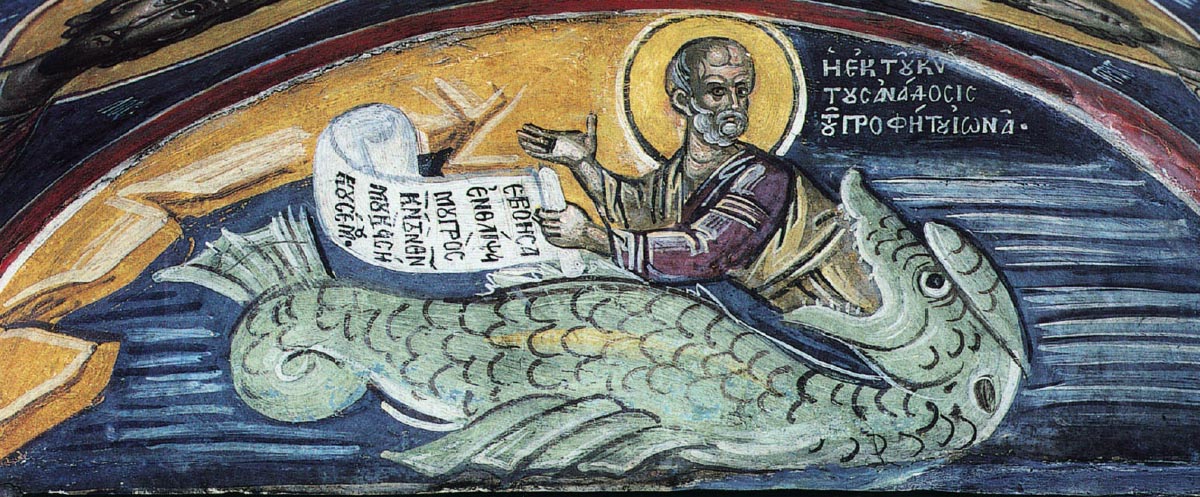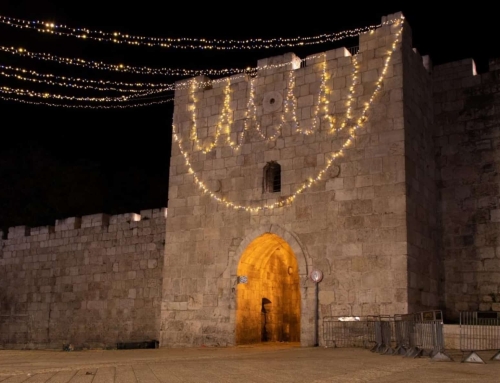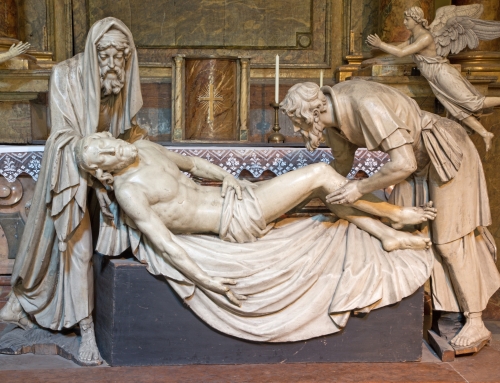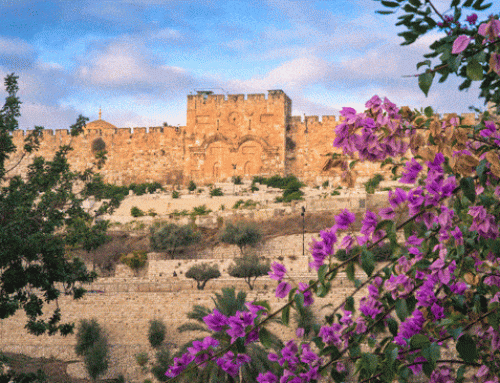By Christine Darg, Jerusalem Channel
Why do the Jewish people read the Book of Jonah annually in the afternoon service of Yom Kippur? Jonah, only four chapters, is the Haftarah portion that is read to instill reflection on God’s willingness to forgive those who repent.
Jonah was commissioned by God to prophesy the destruction of Nineveh, capital of the Asstrian Empire, for that city’s great wickedness. But our reluctant prophet tried to escape from the presence of the Lord by purchasing passage on a boat in Jaffa that was sailing far away west on the Mediterranean Sea to Tarshish, which some scholars interpret to be modern-day Britain.
However, perhaps you know the narrative—the rebel preacher was thrown overboard by the ship’s crew in a supernatural storm, and the disobedient prophet was swallowed by a “big fish” in the Hebrew text. Not a whale. There is another word in Hebrew for whale, leviathan, לִויָתָן
Three days later, the mysterious fish vomited Jonah alive safely on land again.
But I come back to my question–why in the providence of God, do the Jews read this particular story every year on the most solemn day in their calendar, the fast of Yom Kippur, the Day of Atonement?
Could it be that the narrative of the prophet Jonah in the Hebrew scriptures foreshadowed the Messiah—his death, burial and especially his miraculous resurrection on the third day? Jesus said the “sign of the prophet Jonah” was the final sign he would give to his generation. That sign speaks of resurrection.
Several reasons are given for reading the Book of Jonah on Yom Kippur according to various Jewish sources:
First of all, the book reminds us of God’s infinite mercy. S.Y. Agnon, in “Days of Awe,” quotes the Midrash asking, “Master of the Universe, if we repent, will you accept it?” God responded, “Would I accept the repentance of the people of Ninveh, and not yours?” It is good to be reminded that if God could forgive Ninveh in the days of the Bible, God can forgive us. God spared the people of Nineveh although He had already decreed that they should be destroyed because of their evil ways. This teaches us that despite our past behavior, God’s benevolence and mercy await us if we repent full-heartedly.
Secondly, the Book of Jonah serves as a reminder that the entire world, and all of its natural forces, are in God’s hands. The wind, the sea, and the great fish are all used by God in the narrative, reinforcing the statement in Psalm 24, “The earth is the Lord’s and everything in it.”
A third point is that the story of Jonah teaches that no one is beyond the reach of God. Just as Jonah’s attempt to escape God’s assignment by fleeing on a ship in the opposite direction was unfruitful, so, too, we’re incapable of eluding God Almighty.
In “Jonah and Yom Kippur,” by Maya Bernstein, every Jew by the afternoon service on Yom Kippur is Jonah. She wrote, “At this point in the Yom Kippur journey, we are all Jonah. The task is too great, too daunting. We want, simply, to have a sip of water, to sit in the shade, to be undisturbed. And yet we know that Yom Kippur is coming to a close, that the gates will soon be shut, and there is some internal yearning within us, some unquenchable desire to achieve what we dream for ourselves, to rise to the challenges put before us.”
Jonah, the reluctant prophet, is know in theology as a minor prophet (the word minor refers to the size of the text, the length of the message, and not its lack of importance).
In Christian theology, just as God brought Jonah back to life after being swallowed by the great fish, so the resurrection of Jesus vindicates his claim to be Messiah, Saviour and Redeemer of the world.
It is noteworthy that Jesus said in Matthew 12:40, “Just as Jonah was three days and three nights in the belly of the great fish, so will the Son of Man be three days and three nights in the belly of the earth.” Here Jesus drew on imagery found in Jonah’s prayer of Sheol, the dark abode of the dead. While Jonah metaphorically declared, “Out of the belly of Sheol I cried,” Jesus would literally be entombed in the belly of Sheol, he would descend into hell to conquer death on behalf of repentant sinners.
And in Luke 11: 29-32, as the crowds were increasing, Jesus said, “This is a wicked generation. It demands a sign, but none will be given it except the sign of Jonah. For as Jonah was a sign to the Ninevites, so the Son of Man will be a sign to this generation. The Queen of the South will rise at the judgment with the men of this generation and condemn them; for she came from the ends of the earth to hear the wisdom of Solomon, and now One greater than Solomon is here. The men of Nineveh will stand at the judgment with this generation and condemn it; for they repented at the preaching of Jonah, and now One greater than Jonah is here.”
Selah.
Jesus gave a multitude of signs through undeniable messianic miracles of healing the blind, lame and lepers. The ultimate sign Jesus offered, even the sign of the Resurrection, meant that he was born to die as the saviour of the world. Ironically, his nation must hand him over to be crucified by the Romans in order for them to obtain the sign of Jonah!
The commentaries ask, “Does it not almost seem a mockery of the Pharisees, that when they asked a sign which might enable them to receive Jesus as the Messiah, they were denied all but one, which they could only obtain by rejecting Him as the Messiah?”
We are convinced that Jesus performed all that could be done to convince “an evil and adulterous generation,” when He promised them as the last in a long series of miracles “the sign of Jonah the prophet; for as Jonah was a sign unto the Ninevites, so shall also the Son of Man be to this generation.”
Yet the blood of the Crucified made atonement for all.
His blood did not cry out for vengeance, but for pardon and mercy!
Now concerning the lesser preacher, how did Jonah effect such a marvellous persuasive work in Nineveh that caused everybody to repent –from the king in his palace to the pauper in his hovel? Jonah, a foreigner, a stranger, an enemy to that pagan nation, must have given striking evidence that he spoke in God’s name: it was the testimony of his resurrection! As the commentaries point out, ”This prophet of disaster had been sepulchred three days and three nights in the depths of the waters, and then rose up uninjured from that strangest of tombs.” On this unique testimony Niveneh en mass received Jonah as a prophet authorized by God!
After his resurrection onto the shore, Jonah was recommissioned by God to travel to Nineveh and to prophesy to its inhabitants. This time the chastened and repentant preacher obeyed and walked across the city, crying, “In forty days Nineveh shall be overthrown.” Archeologists report discoveries of the fish-god Dagon in sculptures found in Nineveh, Assyria. No doubt telling his strange testimony of near-death in the fish, the people of Nineveh believed the strange messenger, and the king humbled himself, put on sackcloth and sat in ashes, making a proclamation decreeing a fast, including the command to wear sackcloth, to pray, and repent. The entire city was humbled and broken with the people (and even the animals) in sackcloth and ashes.
God saw their repentant hearts and spared the city at that time, but later the Assyrians would carry away the Northern tribes of Israel—and that is why Jonah hated them. He saw them as a strategic threat to his nation.
.
Did you know—I find this so fascinating—that every year the Fast of Nineveh is observed by the Church in the East? The Fast of Nineveh (in Aramit, Aramaic, meaning literally the “Petition of the Ninevites”) is a three-day fast that commemorates the three days that the Prophet Jonah spent in the belly of the Great Fish and the subsequent fast and repentance of the Ninevites at Jonah’s warning message in the Bible. Marutha of Tikrit is known to have imposed the Fast of Nineveh upon the Syriac Orthodox Church until his death on 2 May 649.The fast originated in the Church of the East and later spread to the Oriental Orthodox churches, including the Coptic and Armenian Churches. Did you know that God even today is reviving this church in the midst of great persecutions in anritipcation of Isaiah 19: 23-25? ISIS may have tried to destroy the tomb of Jonah in 2015, but they could not destroy the living church. The Assyrian believers today are greatly persecuted and have paid a gigantic price to maintain their Christian faith.
It is appropriate that Jesus prophesied, ”The men of Nineveh shall rise up in the judgment with this generation, and shall condemn it; for they repented at the preaching of Jonah! and, behold, one greater than Jonah is here.” The evidence recorded in the Gospels of the resurrection of King Messiah, and in the preaching of the apostles and the gift of the descent of the Spirit at Pentecost, far exceeded the preaching of Jonah.
One of the most fascinating aspects of the little Book of Jonah is how the prophet really did not love the people to whom he preached. That makes the miracle of Nineveh’s repentance even greater. Generally speaking, people are more apt to respond to a preacher when they hear in his voice and see in his countenance that he genuinely loves them. Not so with Jonah. After his near-death experience, he was preaching only out of obedience and the fear of God. He was displeased that the people responded. Can you imagine? As an evangelist I would be overjoyed that a whole city responded so beautifully to my Gospel message, but Jonah sulked. He complained that since God is merciful, it was inevitable that God would not fulfil the calamities that he threatened. So he leaves the city and makes himself a little shelter, waiting to see what would happen—if God would destroy the city or not. God causes a plant (in Hebrew a kikayon) to grow over Jonah’s shelter to give him some shade from the sun.And Later, God causes a worm to bite the plant’s root and the leaves wither.] exposing the prophet to the full force of the sun. Now Jonah kvetches, he complains and pleads for God to kill him.
And the LORD said: “Thou hast had pity on the gourd, for which thou hast not laboured, neither madest it grow, which came up in a night, and perished in a night;and should not I have pity on Nineveh, that great city, and also much cattle?”
According to Ellicott’s Commentary for English Readers, the men of Nineveh shall rise . . .–The reasoning is parallel with that of the references to Tyre and Sidon, Sodom and Gomorrah in Matthew 11:21-24, but with this difference, that there the reference was to what might have been, here to what actually had been. The repentance of the heathen, and their search after wisdom, with far poorer opportunities, would put to shame the slowness and unbelief of Jesus’s generation. The word “rise” is used not of the mere fact of resurrection but of standing up as witnesses.
Now concerning Matthew 12, the Lord made some extraordinary claims. In verse 6, he alluded to Himself as being greater than the Temple and now in verses 41 and 42, he says he is greater than Jonah and greater than Solomon: could this be rightly claimed by any man unless he was indeed King Messiah?
As I said earlier, the Hebrew text concerning Jonah’s fish reads dag gadol (Hebrew: דג גדול), which literally means “great fish.” The Septuagint translates this into Greek as ketos megas, (Greek: κῆτος μέγας), “huge fish”; in Greek mythology the term was closely associated with sea monsters. St Jerome later translated the Greek phrase as piscis grandis in his Latin Vulgate, and as cetus in Matthew. At some point, cetus became synonymous with whale (cf. cetyl alcohol, derived from whales). In his 1534 translation, William Tyndale rendered the phrase in Jonah 2:1 as “greate fyshe,” and the word ketos (Greek) or cetus (Latin) in Matthew as “whale”. Tyndale’s translation was later followed by the King James Version of 1611 and refers to the fish as dag gadol, “great fish” in the masculine. However, the Hebrew changes the gender to dagah, female fish. The verses therefore read: “And the LORD provided a great fish (dag gadol, דָּג גּדוֹל, masculine) for Jonah, and it swallowed him, and Jonah sat in the belly of the fish (still male) for three days and nights; then, from the belly of the (dagah, דָּגָה, female) fish, Jonah began to pray.” A transgender fish? Now that’s a very modern spin. The peculiarity of this change of gender led the later rabbis to reason that this means Jonah was comfortable in the roomy male fish, so he didn’t pray, but that God then transferred him to a smaller female fish, in which the prophet was uncomfortable, so he prayed. The confines of a womb comes to mind, and as Jesus said He was typified in Jonah, Jesus was also confined to a woman’s womb, but both were resurrected! The sign of Jonah is the sign of resurrection.
The sign of Jonah will increasingly be confirmed on Yom Kippur. It must be revealed because Bible prophecy is being fulfilled exponentially!
The Book of Jonah stars not the reluctant prophet, but God Himself our Creator. Wrath and judgment have been pronounced against sinners but we have the everlasting Gospel, which offers forgiveness. We see the gospel foreshadowed in the story of Jonah. The Creator warns about judgment but fully forgives those who repent. Our Father, thank You tonight for the familiar story of Jonah. I do believe the gospel that salvation is provided for all who repent and trust in the merit of atonement by Messiah on the cross. Be blessed with your name inscribed in the Lamb’s Book of Life!







Jonah’s conundrum concerned his attitude and timing with the Sovereign Will of God.
It is foreordained that Christ is to return and judge the world, however this requires us to have the correct attitude with His timing.
Sorry Christine… the above post is mine… by the way, I am glad your written script did not contain all the spoken words of your video… do you know what words you added in the video? Quite interesting…
Interestingly Christine, I found this piece of scripture… Song of Solomon 2:7
What do you make of it?
It does express an “attitude”…. is it relevant concerning Christ’s return? Here, I mean is it possible that constant emphasis of His impending return is not the proper attitude? Could it be a “temptation”?